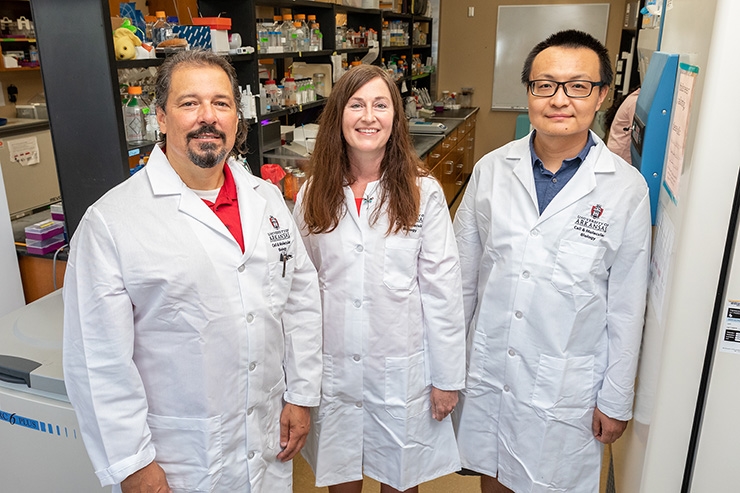The National Science Foundation has awarded a $6.1 million grant to the U of A to establish a research institute focused on virology and virus ecology.
Scientists will study multiple virus systems across all domains of life – Bacteria, Archaea and Eukarya. Their goal is to establish fundamental “rules of life,” or laws of virology, that apply to all viruses – or at least large sets of virus systems.
The grant establishes the Host-Virus Evolutionary Dynamics Institute, based at the U of A, with hub sites at the University of Arkansas at Pine Bluff, the University of Maine, Ouachita Baptist University in Arkadelphia and Universidad Interamericana in Puerto Rico. The institute will be led by Ruben Michael Ceballos, assistant professor in the Department of Biological Sciences at the U of A, collaborating with Michelle Evans-White, professor in the Department of Biological Sciences and Qingyang Zhang, associate professor in the Department of Mathematical Sciences.
Research Focus
Researchers at the Host-Virus Evolutionary Dynamics Institute will study disparate virus systems across domains of life – Bacteria, Archaea and Eukarya. Bacteria and Archaea comprise the prokaryotes, which are single-celled microorganisms with no nuclei. Eukaryotes comprise animals (including humans), plants, single-celled protists and fungi – in other words, all organisms whose cells have nuclei to enclose their DNA apart from the rest of the cell.
Viruses are ubiquitous across all domains of life, and the diversity of the virosphere presents a challenge in establishing universal laws to which all viruses adhere. Studying this is important to help understand the emergence of virulence, propensity for species jump and other fundamental properties of virus-host dynamics.
Researchers at the institute will begin by studying a set of low-virulence double-stranded viruses, including one system from each domain of life, to model virus-host dynamics within and between virus systems. Concurrently, researchers will develop a set of systems to compare and test the universality of fundamental rules developed from the core systems of each domain.
A central goal of the institute will be to expand the suite of viruses by recruiting other labs and institutions to participate in the research. Using a common experimental approach, data from studies of all virus systems will be compared and integrated to generate Rules of Life that drive variables such as species jump, virus harbor state, changes in transmission rates and emergence of highly virulent virus strains. Rules of Life is one of the National Science Foundation’s 10 Big Ideas for pioneering research that will serve the nation’s future.
The institute will be supported by a new microscopy core facility equipped with a high-end confocal fluorescence microscope that is used for live cell imaging, electron microscopes and light microscopes. It will also feature a core virology and virus ecology laboratory. This infrastructure will support U of A research efforts as well as domestic and international collaborative projects, training workshops, planning meetings and initiatives related to diversity, equity and inclusion.
Outreach, Recruitment and Student Training
Through its multiple outreach and scholar training initiatives, the institute will strengthen the university’s commitment to diversity, equity and inclusion. Faculty, students and staff from the University of Arkansas at Pine Bluff, a historically Black college and university; Universidad Interamericana de Puerto Rico, a Hispanic-Serving Institution; and Ouachita Baptist University will be trained and engaged in long-term research collaborations.
In addition to serving as a recruiting tool for the U of A’s multiple graduate programs in the sciences, the institute will build capacity at other minority-serving institutions within NSF EPSCoR jurisdictions. The Experimental Program to Stimulate Competitive Research (EPSCoR) seeks to enhance research competitiveness of targeted jurisdictions – states, territories and commonwealths – by strengthening programs within the fields of science, technology, engineering and math.
As part of its outreach and diversity, equity and inclusion initiatives, researchers at the institute will work with the EAST Initiative, Dawson Education Services Cooperative and Ozark Catholic Academy to deliver curricular supplements, host workshops and build understanding of topics in virology and virus ecology at K-12 institutions within Arkansas and other EPSCoR jurisdictions.
Research Members
E. Han Tan, assistant professor in the School of Biology and Ecology at the University of Maine; Anissa Buckner, professor and chair of the Department of Biology at the University of Arkansas at Pine Bluff; Nathan Reyna, associate professor at Ouachita Baptist University; and Elizabeth Padilla, assistant professor at La Universidad Interamericana, will serve as co-principal investigators on the NSF grant and will lead hubs at these partner institutions.
About the University of Arkansas: As Arkansas' flagship institution, the U of A provides an internationally competitive education in more than 200 academic programs. Founded in 1871, the U of A contributes more than $2.2 billion to Arkansas’ economy through the teaching of new knowledge and skills, entrepreneurship and job development, discovery through research and creative activity while also providing training for professional disciplines. The Carnegie Foundation classifies the U of A among the top 3% of U.S. colleges and universities with the highest level of research activity. U.S. News & World Report ranks the U of A among the top public universities in the nation. See how the U of A works to build a better world at Arkansas Research News.
Topics
Contacts
Matt McGowan, assistant director of research communications
University Relations
479-856-2177, dmcgowa@uark.edu
Ruben Michael Ceballos, assistant professor, Department of Biological Sciences
Fulbright College of Arts and Sciences
479-575-5643, ceballos@uark.edu
